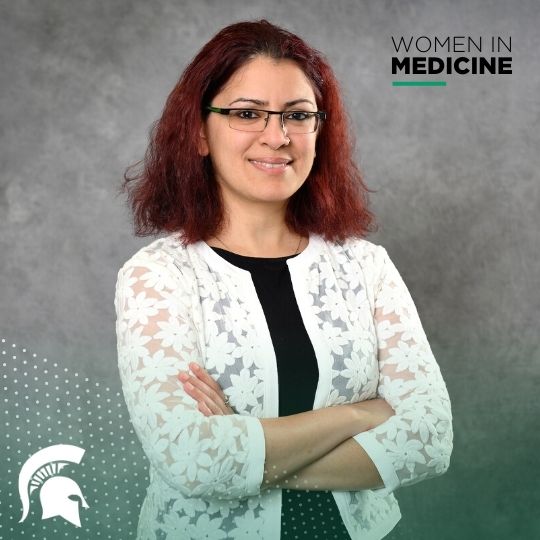Improper Folds in Uterus Can Result in Miscarriage
September 27, 2022
In honor of Women in Medicine Month, the College of Human Medicine celebrates Ripla Arora, PhD, assistant professor, Department of Obstetrics, Gynecology and Reproductive Biology. Her research is focused on maternal-fetal interactions during pregnancy. She is the 2022 recipient of the Jean P. Schultz Biomedical Research Endowment Fund award.
 Around 75% of failed pregnancies occur due to problems with the embryo or the maternal environment. The uterus in particular plays a big role in pregnancies occurring through both natural conception and in vitro fertilization.
Around 75% of failed pregnancies occur due to problems with the embryo or the maternal environment. The uterus in particular plays a big role in pregnancies occurring through both natural conception and in vitro fertilization.
“Subtle changes in the shape of a uterus, particularly incorrect folding of the lining, can increase the risk of miscarriage,” said Ripla Arora, PhD, an assistant professor of Obstetrics, Gynecology and Reproductive Biology in the College of Human Medicine. “The literature supports the idea that this folding of the uterine lining is important in several species,” she added. “If the folding is messed up, an embryo can still attach, but it can result in a miscarriage.”
Arora, who also is a member of the Division of Developmental and Stem Cell Biology in the MSU Institute for Quantitative Health Science and Engineering, recently received a $1.98 million grant from the National Institutes of Health to study how changes in levels of the hormone progesterone affect the folds in the uterus, making it either receptive or unfavorable to pregnancy.
Arora’s lab developed a novel technology to visualize and analyze three-dimensional images of the uterus during conception and establishment of pregnancy using whole organ confocal microscopy. “Similar images can be obtained using ultrasound imaging to get an idea of how the tube folds during the menstrual cycle in women,” she said.
Her study is significant for women who have difficulty becoming pregnant and carrying a pregnancy to term. The study also has implications for women who undergo in vitro fertilization. During that process, a physician hyper stimulates a woman’s ovaries to produce more eggs, resulting in an increased level of progesterone.
“Our idea is that when you have all that progesterone, the shape of the tube is not receptive to embryo attachment,” Arora said. Giving the uterus a little rest and allowing progesterone to return to a normal level before implanting an embryo could promote proper folding more conducive to a successful pregnancy.
For her study, Arora will recruit women to determine how serum progesterone levels in their blood correlates to folding in the uterus. When properly folded, the uterus creates a place for an embryo to implant and grow, she said.
“I’m very excited about the application of our work to reproductive medicine,” Arora said. “We want to know, what are the mechanics behind the shape of the uterus? Why do you get pregnancy loss whenever folding is disrupted?”
“The long-term goal of the project,” she added, “is to help women.”

